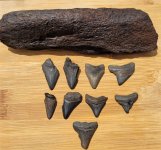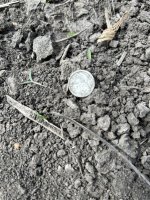devan
Jr. Member
Hi,
Hit the beach today for almost 2 hours and found very LITTLE of anything
about $0.60 in change, 2 modern playground tokens and a 1c coin from 1976
I'm I missing something, doing something wrong

The beach I was at has been used from the early 1900's and is about .80 miles long and about .20 miles wide,
I first concentrated on the dry sand where the most people tend to sit and relax, then I went to the water's edge in the wet
sand, sensitivity had to be turned down to about half, but worked like a dream in the sand ( just no finds )
)
Any advise on using my MD at the beach will be appreciated, many thanks for reading
Devan
Hit the beach today for almost 2 hours and found very LITTLE of anything

about $0.60 in change, 2 modern playground tokens and a 1c coin from 1976

I'm I missing something, doing something wrong


The beach I was at has been used from the early 1900's and is about .80 miles long and about .20 miles wide,
I first concentrated on the dry sand where the most people tend to sit and relax, then I went to the water's edge in the wet
sand, sensitivity had to be turned down to about half, but worked like a dream in the sand ( just no finds
 )
)Any advise on using my MD at the beach will be appreciated, many thanks for reading
Devan







